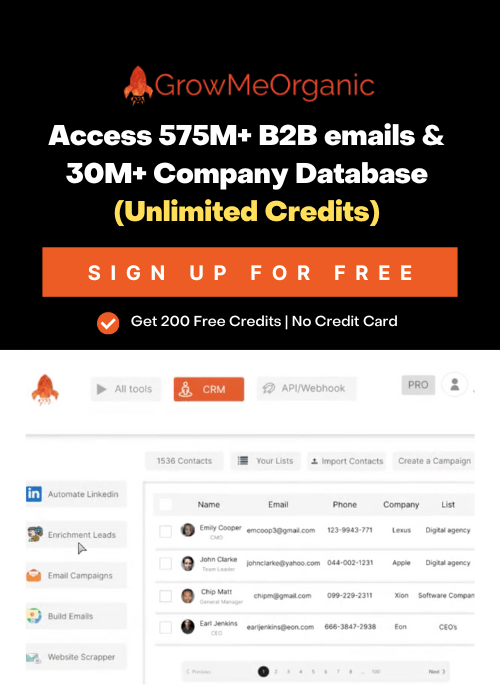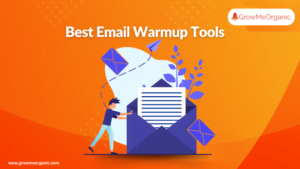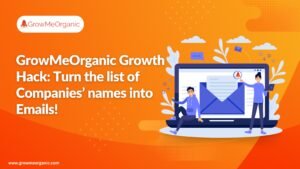Lead generation is the starting point for driving business growth, helping you connect with potential customers and stand out from competitors.
But with today’s intense competition, generating quality leads has become a real challenge, impacting growth and sales for many companies.
That’s where a lead generation agency steps in.
These agencies focus on finding high-quality leads for businesses, allowing them to expand outreach and concentrate on conversions, easing the overall sales load.
Curious about launching a lead generation business? Before diving in, let’s understand the unique challenges it presents.
This article covers everything you need – from common hurdles to strategies for success.
What Are the Types of Lead Generation?
Lead generation is the initial step of relationship building, and it can be categorized as inbound or outbound leads. The difference between inbound vs outbound leads are as follows:
Inbound Lead Generation
Inbound lead generation refers to attracting potential customers through content tailored to their needs. Focusing on the target audience’s interests can convert visitors into leads using lead capture forms and landing pages.
Outbound Lead Generation
On the other hand, outbound lead generation is a traditional method in which businesses directly contact consumers using cold calls, emails, or messages. The goal is to capture their interests and convert them into buyers. It involves strategies to persuade consumers who may not be actively interested in your products.
Challenges Involved in Lead Generation Business
Every business faces challenges, and lead generation is no exception. If you’re eager to dive in, knowing what you’re up against is essential. Here are the key challenges in the lead generation business.
Client Acquisition Hardships
Acquiring clients for a lead generation business and convincing them to buy your services can be challenging. Building a client base is vital, but with constant cold calls and pitches flooding customers, it’s tough for companies to stand out.
But, once you crack the deal and find a way to get through, you can build a successful lead generation business.
Managing Budget and Expenses
Finance is the foundation of every business making effective budget and expense management essential for long-term stability. This includes proper expense reconciliation to track spending, ensure accuracy, and prevent financial discrepancies. However, most newbies in the lead generation business find it difficult to manage expenses and budgets, which puts their sustenance in question.
Creating a comprehensive budget before starting the lead generation business would give you an overview of all expenses, including marketing, software, salaries, etc.
Legal Requirement of Lead Generation
A major challenge in lead generation is navigating legal regulations. Too often, people dive in without understanding the rules, risking reputation damage and potential shutdowns.
Therefore, thoroughly research the legal requirements associated with lead generation and plan to comply with them.
How Do You Get Started With A Lead Generation Business?
Now that you know the challenges of starting a lead generation business, let’s discuss the steps to launch it successfully. Here’s what you need to get your lead generation agency off the ground.
Step 1 – Choose An Industry Or Niche Area
The first step is choosing an industry or niche area to operate in. Thorough research of different industries helps you in the long run. Every successful agency thrives in a niche. Picking one without enough know-how can cause trouble.
Understanding the market and identifying gaps is advised. Before identifying a niche area, here are a few things to note.
- Identify those areas that pay more per lead.
- Identify the market size.
- Identify the difficulty level of getting through to the leads.
- Consider what scope of services to offer.
- Identify the types of companies to work with in the niche area.
Step 2 – Identify Costs And Fees
Today’s consumer market is price-sensitive, and working with it can be tedious. Therefore, one must research the industry before implementing its pricing models for the lead generation business.
Even though there are various pricing models, the hybrid pricing model is recommended for start-ups entering the lead generation business.
In a hybrid pricing model, your clients select the amount that they would pay you for specialized lead generation; it can be of three types:
- The full cost of lead generation ads or campaigns—Here, the client pays a lumpsum amount covering all the expenses for lead generation ads and campaigns.
- A percentage-based cost—Here, the client only pays a certain percentage for the sales made to each lead converted to customers. The percentage can vary from client to client, but the usual rate is between 10% and 20%.
- A lead-based fee – Here, the client pays for each generated lead.
Wondering which one is best?
| “Depending on how many leads and of what quality leads do you prefer and the lead info. However as an expert, at times I prefer charging per lead rather than charging for the entire lead.” |
This is what Rexham, a Quora User, mentioned during a discussion. In the hybrid model, the client is satisfied; however, you must ascertain that your margins are high enough to generate profits.
Step 3 – Understand The Laws Associated With Lead Generation
Take note of all the laws and regulations associated with starting a lead generation business. As it deals with consumer data, regional and global laws regulate it. These laws must be complied with for ethical practices, consumer protection, and to avoid legal charges.
Here are some laws one should consider –
- CAN-SPAM ACT: This act applies to all of the United States and regulates commercial emails and messages. It enforces the use of accurate sender information and avoids misleading subject lines.
- GENERAL DATA PROTECTION REGULATION ACT: This act applies to lead generation businesses operating in the European Union and mandates the protection of individuals’ data, including the enforcement of obtaining consent and ensuring data security measures.
- CALIFORNIA CONSUMER PRIVACY ACT: This act applies to all businesses operating in California and requires them to establish transparency in data collection and access to personal information.
- CANADIAN ANTI-SPAM LEGISLATION: The act regulates all commercial emails and text messages sent to individuals residing in Canada. It enforces transparency in the data collection process, requires firms to obtain clear consent and identification, and provides easy unsubscribe options to individuals.
Step 4 – Determine Your Strategy
Now that you know how to choose a niche and the laws associated with lead generation, create a plan for your business. A plan for finding quality leads and achieving client satisfaction.
You can also rely on business lead sources that help you acquire quality leads. The source is often identified with a focus on the industry in which you operate. For example, one can rely on lead brokers, social media platforms such as LinkedIn or Facebook, Paid ads, Cold emails, etc.
A lead broker is a data provider having access to a B2B contact database. With the help of such lead lists, you can crack the lead generation business.
GrowMeOrganic is an excellent example of a B2B data provider. Access 15 million companies, over 575 million B2B contact databases, unlimited professional contacts, and hyper-personalized cold emailing options.
Step 5 – Identify Your Target Audience
Now, it’s time to find clients to buy your leads. For this, you need to identify your target audience and develop connections by reaching out.
To get potential buyers of your leads, list down all the companies that operate in your area and use social media platforms to reach out to them. While listing your target audience, you must create ideal customer profiles with their key characteristics, pain points, and requirements.
It also helps you to manage your clients effectively. The chart below represents what a customer profile should look like:

Once you know your clients, identify their pain points, motivations, and goals to offer leads that meet their needs. Moreover, mapping a customer’s journey in the B2B sales funnel helps you attract more prospective clients and scale your business.
Step 6 – Build Material For Marketing
One of the biggest pushes for your lead generation business is quality marketing. Your marketing efforts are crucial for your business as it helps scale it. Using a social media planning calendar can streamline your approach. They should match your business to operate efficiently and lure customers to your brand.
For the most successful marketing campaign, you need a good business name, domain, website, and social media accounts across social media platforms to run ads. It would also help you circulate information and other materials related to your brand.
Remember that your website plays a significant role in optimizing your digital presence. It is the only place where you win your customers with creative landing pages, whitepapers, e-books, blogs, etc.
Another marketing strategy that can draw people to your website is SEO or search engine optimization. With proper SEO strategies, you can create blogs that rank on top searches, making prospects visit your website. Once the leads visit your website, you can use lead magnets and opt-in forms to channel them to your landing pages.
To attract customers, create posts and sponsored ads on LinkedIn and other social media platforms and link them to your website.
Step 7 – Work On Your Outreach Strategies
The lead generation business does not end with finding leads; it also includes finding potential customers to sell those leads. Finding potential buyers can be a tiring task without proper outreach activities.
Outreach activities are essential for connecting with clients and showcasing your services. Done right, they boost brand awareness, build relationships, and drive lead generation.
Looking for effective outreach strategies? Here are some you can start using today.
- Cold Calling: It involves calling your potential target audience and persuading them to buy your products.
- Cold Emailing: Cold emailing is similar to cold calling, but the only difference is that you use emails to reach out to customers. Cold emails must be personalized and sent to potential consumers to attract attention.
When used effectively, cold emailing can be valuable for lead generation and securing profitable leads. The table below demonstrates the scalable and repeatable nature of cold emails.
- Using Social Media Connections: Social media platforms have provided another way to connect with your prospects. One can disseminate information using social media platforms and reach out to prospects using LinkedIn prospecting, which involves reaching clients using direct messages on LinkedIn and other social media platforms.
- Face-to-face pitching: This technique of reaching outcomes later after an initial mail or call conversation with the prospect. Once you get through your prospects with mail or social media connections, you can set up physical meetings to convince them to buy your services.
Step 8 – Track And Measure Your Progress To Optimize The Process
The next step is to measure your lead generation efforts. You might think about how to measure performance in lead generation. Well, here’s the answer.
You can measure your key performance indicators (KPIs), return on investment (ROI), and conversion matrix, which provide insights to help scale your business.
- Key Performance Indicator (KPI) – These quantifiable metrics track your business operations and assess their progress towards goals. For example, you can set KPIs for lead conversion, total value of leads converted, number of leads generated, etc.
- Return On Investment (ROI): It is a financial matrix that measures the profitability and time of your investment in the business. The ROI is expressed as a percentage or ratio, and a high ROI indicates favorable gains.
- Conversion Matrix—A lead conversion matrix finds the conversion ratio of identified leads. You can gather this data from your clients and categorize leads based on quality and conversion. A high conversion rate indicates the success of your efforts.
Moreover, measuring your performance is an ongoing process. You should take steps to measure performance regularly to identify grey areas and refine strategies to avoid system failure.
5 Strategies to Make Lead Sourcing a Success
Finding a reliable source for high-quality, high-conversion leads is crucial in any lead generation business. If you’re unsure where to start, here are some effective lead-generation strategies to help.
Use an Existing Database or Lead Finder
The simplest way to acquire leads is to use an existing database or a lead finder platform that allows you access to tons of data for minimal fees. As discussed earlier, lead finders are cloud-based platforms with access to existing user data to help you build a prospect list.
GrowMeOrganic is one of the best lead-finder platforms. Our tool has an intelligent user database with over 575 million verified professional data points. Depending on your niche, you can use our technology to navigate these databases conveniently.

With GrowMeOrganic, you can unlock key company data and prospects in bulk with an instant click. You can access our LinkedIn lead extractor to extract professionals’ data instantly. Get a hyper-personalized email feature to connect with professionals across industries, jobs, and countries.
Key feature:
- Verified Contacts
- Emails and Phone Numbers
- Company details
- Automated bulk Exports
- Better Outreach
- Human-like Automation
- Hyper-personalized emails
- Interactive User Interface.
Leverage Cold Outreach Methods
Leveraging cold outreach is another means of generating leads. Cold outreach methods include cold calling and emailing, making initiating conversations with prospects easier.
It is a tested method that works if appropriately implemented. Though it has developed a bad reputation with telemarketers disrupting the market, it is the most effective and comparatively easier to implement. With GrowMeOrganic, you can swiftly reach your prospects and scale your business.
Using Search Engine Optimization
Simply put, Search Engine Optimization is a marketing strategy that diverts traffic to your website without hassle with lead identification. It uses techniques to make your domain more visible to users and rank your website in the top searches.
Three approaches make SEO the most trusted way of luring traffic to a website, and they are:
- On-page SEO means optimizing HTML Links, creating quality content, and using relevant keywords to improve website ranking.
- Off-page SEO means email outreach, guest postings, and broken link building to improve your website rankings.
- Technical SEO means improving your website by realigning the internal linking structure, page speed, interactive design, and more.
If you are thinking about how important SEO is for lead generation, here’s what Hamza Rehman mentioned in a Quora discussion.
| “SEO is crucial for lead generation as it enhances a website’s visibility in search engine results, making it easier for potential customers to find your business. By optimizing content with relevant keywords, businesses can attract organic traffic, which often leads to higher-quality leads interested in their products or services. Additionally, effective SEO builds trust and credibility, as users are more likely to engage with sites that appear at the top of search results, ultimately driving conversions and sales.” |
Make Use of Paid Ads
Using paid ads effectively can be one of the best strategies for driving traffic to your website. With paid digital spaces, you can feature on premium websites, search results, social media feeds, etc.
Paid ads are available for all websites in different formats and types. Some examples of paid ads include display ads, pay-per-click ads (PPC), and search engine ads.
When asked about which is better for lead generation SEO or Paid ads on a Quora discussion, Henry Thomas says:
| “The choice between SEO and PPC advertising depends on your specific goals, budget, and timeline. SEO focuses on organic search visibility, building long-term traffic, and credibility. PPC advertising offers immediate visibility through paid ads, targeting specific keywords and demographics. For sustainable growth, investing in both strategies can be beneficial.” |
Prospecting Lead through Social Media
Reaching out to unknown prospects can be challenging, but not with social media. Social media platforms help effectively reach your prospects with little effort and a pleasing message.
You should be on platforms like LinkedIn and Facebook to engage your clients and drive them into your sales funnel.
Final Words
Starting a lead generation business can be both challenging and rewarding. But to scale it, you should understand the underlying challenges and form strategies accordingly.
Effective lead generation is more about connecting with leads than just identifying them. This is where GrowMeOrganic comes into play. We are one of the best lead generation platforms that provide you access to data from over 15 million+ companies and 575 million+ verified professionals to connect with.
With us, you can manage your emails, respond to them on the go, and improve your email deliverability. Click here to learn more.
FAQs
Q 1. What Is The Cost Of Starting A Lead Generation Business?
Starting a lead generation business requires proper financial planning. The cost may vary from $5000 to $6000, including licensing, registration, marketing, acquiring leads, office set-up, website, etc.
Q 2. How To Do B2B Lead Generation?
The following steps are involved in a B2B lead generation process:
- Identifying prospects in your niche area.
- Creating engaging content and sharing on social media.
- Using capture forms and landing pages to drive traffic.
- Nurturing leads with regular follow-ups.
Q 3. How To Identify Target Audience In Lead Generation Business?
One can identify a target audience by researching the market and listing companies in the niche area.
Q 4. How To Make Money With Lead Generation Business?
You can make money with lead generation by providing companies with a list of potential buyers, and they pay you in the following ways:
- Pay per lead generated.
- Pay per lead converted.
- A lump-sum amount for the lead generation process.
About Post Author
Anant Gupta
Growth Hacker, Marketing Automation Enthusiast & Founder of GrowMeOrganic




![How To Easily Export Leads From Linkedin Sales Navigator? [2024 Tutorial]](https://www.growmeorganic.com/wp-content/uploads/2024/06/export-leads-300x169.jpg)


